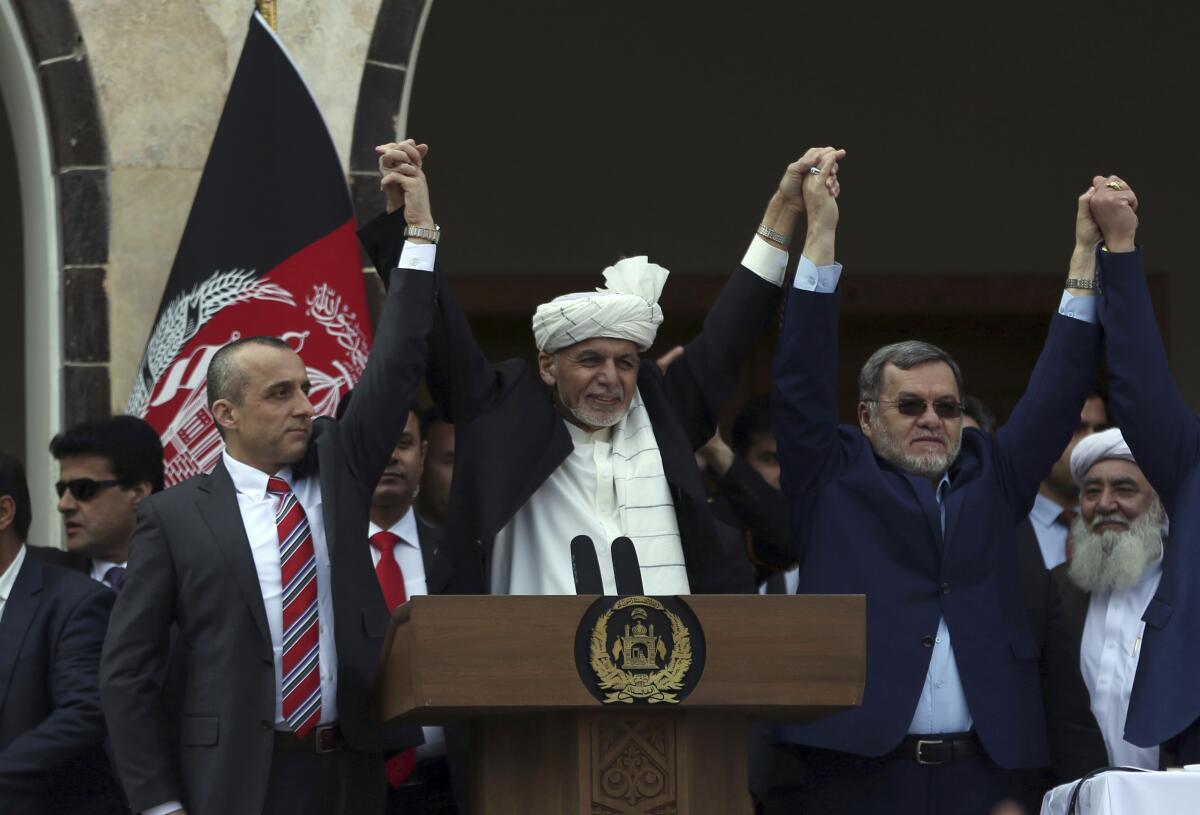Afghan president and rival announce power-sharing agreement

- Share via
KABUL, Afghanistan — Afghan President Ashraf Ghani and political rival Abdullah Abdullah have signed a power-sharing agreement two months after both declared themselves the winner of September’s presidential election.
Ghani spokesman Sediq Sediqqi tweeted Sunday that a political deal between Ghani and Abdullah had been signed in which Ghani would remain president of the war-torn nation. The deal calls for Abdullah to lead the war-torn country’s National Reconciliation High Council and some members of Abdullah’s team would be included in Ghani’s Cabinet.
The Reconciliation Council has been given the authority to handle and approve all affairs related to Afghanistan’s peace process.
Omed Maisam, a spokesman for Abdullah’s team, confirmed an agreement had been signed at the presidential palace. “A technical team will work on the implementation of the agreement and details will be shared later,” he said.
Afghanistan has been in political disarray since the country’s election commission in December announced Ghani had won the Sept. 28 election with more than 50% of the vote. Abdullah had received more than 39% of the vote, according to the election commission, but he and the Electoral Complaints Commission alleged widespread voting irregularities.
Ghani and Abdullah both declared themselves president in parallel inauguration ceremonies in March. They have been locked in a power struggle since then and the discord prompted the Trump administration to announce it would cut $1 billion in assistance to Afghanistan if the two can’t work out their differences.
The government is trying to prevent a new disaster on Mt. St. Helens — the breach of a 73-billion-gallon lake held in place by debris from the 1980 eruption.
A peace agreement between the U.S. and the Taliban signed Feb. 29 calls for U.S. and North Atlantic Treaty Organization troops to leave Afghanistan. It was seen at the time as Afghanistan’s best chance for peace in decades of war.
Since then, the U.S. has been trying to get the Taliban and the Afghan government to begin intra-Afghan negotiations, but the political turmoil and personal acrimony between Ghani and Abdullah impeded talks. Negotiations that were to take place in March never happened.
After 18 years and billions of dollars in international aid, Afghanistan remains desperately poor. The poverty level soared from 35% of the population in 2012 to more than 55% last year. Poverty in Afghanistan is defined as a person who survives on $1 or less a day. Successive Afghan governments, including Ghani’s, have been accused by international watchdogs of widespread corruption.
Meanwhile, Kabul and other cities are in lockdown to stem the spread of the coronavirus. Afghanistan has performed only limited testing so far, with about 22,000 tested. The country of 36.6 million has more than 6,600 confirmed infections. As more testing becomes available, the country’s confirmed infection numbers will probably rise sharply, according to public health officials. The death toll — officially at 169 — is probably much higher.
The country’s healthcare system, devastated by four decades of war, is woefully unprepared for a major outbreak.
More to Read
Sign up for Essential California
The most important California stories and recommendations in your inbox every morning.
You may occasionally receive promotional content from the Los Angeles Times.













